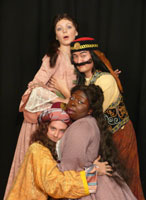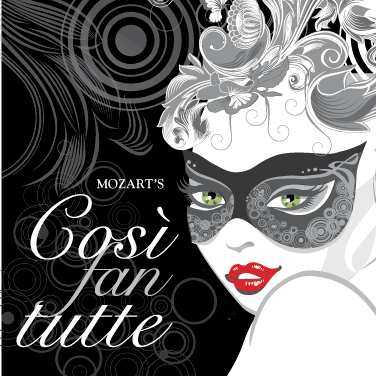Temple University’s Opera Theater opened their fall opera, Mozart’s COSI FAN TUTTE, on Friday November 19th. Directed by Marc Astafan and conducted by Andrew Altenbach, the opera was acted by both graduate and under-grad voice students. It is sung in Italian but subtitles were provided. The story takes place in 18th century Naples.

from top running clockwise: Ekaterina Steysuk as Fiordiligi, David Koh as Ferrando, Crystal Charles as Dorabella, and Chad Somers as Guglielmo in Temple University Opera Theater production of Mozart's COSI FAN TUTTE.
The original plot follows two soldiers, Guglielmo and Ferrando. They are betrothed to sisters, Fiordiligi and Dorabella. Don Alfonso, an old philosopher, bets the men that they’re women, like all women (his words, not mine), will not be faithful to them if they were to go to war. The soldiers accept his wager. Don Alfonso tells the sisters that their fiancés are sent to war. The soldiers later return, only in disguise as mustached Albanian men and they seduce each other’s lovers. Fiordiligi and Dorabella are oblivious to the bet and the fact these foreign men are actually their own. They vow to remain faithful to their lovers but as the opera proceeds, their feelings win the best of them and they promise to marry the “Albanian” men in a double wedding. Meanwhile, the maid of the sisters, Despina, is in on the bet as well. Don Alfonso pays her off so that she may help him win the bet.
The translation of COSI FAN TUTTE is “all women are like that.” Based on the original plot, the word “that” may signify other words such as untrustworthy, fickle, wishy-washy, and/or ignorant. Sounds sexist, doesn’t it? The director, Marc Astafan, agreed that the title translation was a little bit on the chauvinistic side so he thought, “Hey! Why not change the plot?” He did this by having the sisters eavesdrop on the soldiers’ private conversations with Don Alfonso, making them aware of the bet and the faux Albanians, while making them appear more intelligent.
I applaud the director for using his dramatic license and taking a risk, however, I feel it was unsuccessful. Although the plot changed, the score and libretto did not, which made the plot and the material inconsistent. If the sister’s knew about the bet and he wanted them to appear to be “intelligent and cunning,” why would they let their feelings get the best of them and fall for each other’s fiancés? Also, I was waiting for the sisters to tell the soldiers and Don Alfonso that they knew about the hoax and for the women to come out victorious but no such thing happened and it left me and my friends very confused.
The disoriented plot did not overshadow the great performances by the six principal characters and a chorus of twelve. The principals were double cast and each actor will get one show (one on Friday and one on Sunday.) I was very fortunate to see the principals I saw on Friday. Bass, Clayton Mathews as Don Alfonso was great. His low, rich tone left nothing to be desired and I was very happy every time he sang. The maid, Despina, was sung by soprano, Rachel Zatcoff. Ms. Zatcoff was a joy to watch and listen to. She played the comic relief very well and held great composure when a certain mustache unintentionally fell off her face. The sisters, Fiordiligi and Dorabella were sung by soprano, Ekaterina Stetsyuk and mezzo-soprano, Crystal Charles. The women sung beautifully together and separately. However, I would have loved to have seen more energy from Ms. Stetsyuk. Her voice was beautiful but the two arias she sang left a little to be desired. The soldiers, Ferrando and Guglielmo were sung by tenor, David Koh and baritone, Adam Barta. Mr. Koh’s lyric tenor voice was exquisite and soared through the theater. Adam Barta has a great career ahead of him. He was the most convincing of the six and his aria in Act II was the showstopper for me. He also held great composure when he, dressed as an Albanian, gives Dorabella his medal and the medal incidentally falls off its ribbon and onto the floor. Mr. Barta brilliantly covers this by stuffing both the medal and ribbon down Dorabella’s cleavage. The Met is calling your name Mr. Barta.
Mr. Andrew Altenbach conducted the 37 piece orchestra with pride. I found myself watching him instead of the opera sometimes. The student filled orchestra sounded very professional and I’m sure Mozart would’ve been very proud that they played his beautiful score very well.
The set design (set designer unknown) and the lighting designed by Adam Macks complimented each other very well. The lovely garden was constructed beautifully and accurately. I believed it was a garden in Naples in the 18th century. The beautiful costumes were designed by Connie Koppe. Ms. Koppe definitely had her work cut out for her designing this opera with so many different costumes but she did it effortlessly.
Temple should be very proud, not only of this production, but the fact they are still keeping the art of opera alive and they are doing it well.
COSI FAN TUTTE
Score by Woflgang Amadeus Mozart
Libretto by Lorenzo Da Ponte
Directed by Marc Astafan
Conducted by Andrew Altenbach
Producer: Jamie Johnson
Friday, November 19, 2010 7:30 p.m.
Sunday, November 21, 2010 3:00 p.m.
Temple University Opera Theater
Boyer College of Music and Dance
Tomlinson Theater
NW Corner 13th and Norris Streets
Philadelphia PA
www.temple.edu/boyer


